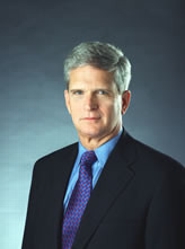
Edward “Ned” Walker ’62, the Christian A. Johnson Distinguished Professor of Global Political Theory and former ambassador to Egypt and Israel, discussed the election of the Muslim Brotherhood candidate Mohamed Morsi as Egypt’s next president with host Candy Crowley on the June 24 broadcast of CNN’s State of the Union. The New York Times in a June 25 article titled “Egypt Results Leave White House Relieved but Watchful” included one of Walker’s comments from the CNN interview.
“One thing he's got to do, Morsi's … got to establish his credentials with the people that he lost to, that he lost in the election,” said Walker on State of the Union. “This was a very close election. And it doesn't show a unified country. It shows a country that's basically divided in two. He might be able to accomplish that, but he'll have to do it with the oversight of the military who still retains the overall authority and power.
“Now this result was great for the military. You've got to compliment them on their ability to make things turn out well for them. Just imagine what it would have been like if Shafik had won. There would be rioting in the streets. There'd be teargas out there. There would be tanks in the square. They didn't want that. They found a way to emasculate the Brotherhood before it ever took over.
“So I think they're still very much in command. And I think they will support the -- continue to support the treaty with Israel. I think they will continue to try to resolve the outstanding issues with the United States.
“It's not at all as bad perspective from their point of view. And it may not be so bad for us either.”
In The New York Times article, which addressed the challenges and opportunities that await the Obama administration in dealing with Egypt’s new ruler, Walker was quoted from the Crowley interview. “It is going to be very difficult for us to work with a Muslim Brotherhood, particularly since we have been isolating and ignoring them for the last 30 years.”
During the CNN broadcast, Walker responded to Crowley's pointing to the fact that the United States has given the Egyptian military $1 billion a year in funding and the military's huge "power grab" since the Arab Spring. “... what they have done most recently is made it virtually impossible for anybody to lead the country as president, because they have taken his powers away from him. Now, I think that the United States has a huge interest in our military, in our cooperation with the Egyptians. And remember, there is another election coming up very shortly in Libya, which could be influenced by this.”
In response to Crowley’s question on Morsi’s attitude toward the United States, Walker replied, “For one thing, two of his children are U.S. citizens. So he's certainly got some ties.
“I don't think he's a great supporter, fan of the United States. He came out of the background really in this when the primary Brotherhood candidate was disallowed. He's not very charismatic. He is, however, a true believer in the Brotherhood's program. And if you go to the program, you can see it has some good points and some bad points.
“Some of the bad points is it's a top-down autocratic leadership. Once a decision is made, everyone is supposed to salute and pay attention to it. So, it has some anti-democratic components to it. We haven't seen the last of this particular power play.”
Note: Additional portions of the CNN interview with Walker can be found at http://transcripts.cnn.com/TRANSCRIPTS/1206/24/sotu.01.html
